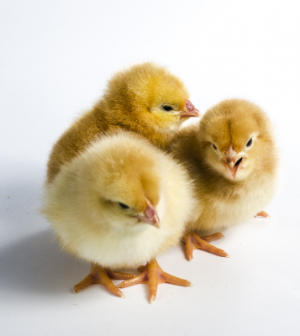- Do you subscribe to Dharma Dog Training’s Newsletter? You should.
- A Unique Campaign from The Humane Society of the United States
- Rabid bats in Omaha- Stay safe, prepared with these tips
- Springtime Activities in Omaha
- Mill Dog Monthly from Bailing Out Benji
- World Spay Day, Legislative Alert in Nebraska
- Attend the Nebraska Rescue Council’s monthly meeting this Saturday
- Five Hard-to-Ignore Reasons to Adopt!
- Paws in Pink to Benefit Breast Cancer Foundation
- VCA, Inc. Acquires MidWest Vet Specialists from Kansas State University
How to Properly Care for New Baby Chicks

Ready to raise a coop of chickens in your backyard and have a ton of farm-fresh eggs?
Well, hold your horses. You’ll need to learn quite a few things before getting started.
Although chickens are known for being easy to maintain once they become adults, the tricky part is taking good care of them while they’re still growing.
What’s the best way to raise a coop of baby chicks, you ask?
Read on to learn everything you’ll need to know about properly caring for your new chicken coop.
Always Start With Chick Feeders
From the offset, you’ll want to have chick feeders handy, but only for the first 2 weeks. As your chicks grow older, they’ll make a mess and render your starter feeders useless.
They love to stomp all over them, tip them over, and will sometimes eat non-edible materials if their food is scattered all over the floor.
Unfortunately, chicks aren’t very smart, so you will have to replace their chick feeders with plastic feeders once your baby chicks are old enough to stomp around and cause a fuss.
Consider buying plastic feeders that are durable and just the right height for your brooder floor. Your objective here is to prevent your baby chicks from getting too messy.
Bonus points for buying red plastic feeders. Baby chicks are attracted to the color red. They’ll also easily find their food this way.
Waterers and Feeders Must Be Properly Maintained
It goes without saying that your baby chicks will not survive if you don’t consistently take care of them.
These days, you can receive a box of baby chicks from the mail.
The shipping process is simple and doesn’t take long, but your chicks will be sure to peep restlessly at your door hungry, thirsty, and in need of your immediate attention and care.
Provide preemptive care for baby chicks by having your organic chicken feed and water ready for them as soon as they arrive. Also, don’t forget the chicken coop cleaner!
Set Up Their Brooding Area
Providing adequate food and water is only one piece of the preparation process.
The next step is to set up their brooding area. You’ll want to buy:
- A brooder lamp
- Feeders and waterers
- Bedding
- Cardboard, wood, or plastic bedding containers
- Lighting
- Brooder guards
Make sure your baby chicks stay warm. Your brooder lamp should maintain a steady temperature of 95 degrees Fahrenheit.
Place the waterers and feeders around the edges so they are in the Goldilocks zone of the lamp’s heat. Place a thermometer probe underneath the lamp to keep an accurate measure of its heat.
It might take a few hours for your lamp to stabilize the temperature in your brooding area, so make sure it’s set up long before your baby chicks arrive.
Pet Care Best Practices
When handling baby chicks or even adult hens, be consistent with these practices. It will save you quite a bit of heartache in the long run.
- Wash your hands before and after touching your baby chicks or anything inside of the brooding area
- Hand sanitizer works as a safe alternative
- Keep children age 5 or younger away from the brooding area
- Don’t eat or drink near or around the brooding area
Another thing to note is to make sure you thoroughly cook your eggs. Hens that appear healthy may pass salmonella into the inside of healthy-looking eggs.
You may notice there is a pattern here. The trick to keeping your baby chicks safe and healthy is to be diligent about safety and cleanliness. It will decrease their already quite high mortality rate in these trying weeks.
Want to Learn More About Raising Baby Chicks?
There’s nothing more important to us than ensuring the safety and well-being of animals.
Be sure to read more of our blog content to learn all you need to know about raising baby chicks and more!
Latest News
-
Join Us at Pick A Pooch 2025: A Fun-Filled Weekend for the Whole Family
A Fun-Filled Weekend for Pet Lovers and Families Alike Mark...
- Posted 1 year ago
- 0
-
Beardmore Presenting Sponsor At This Years Pick-A-Pooch event
🐾 We are thrilled to announce that Beardmore Subaru is...
- Posted 3 weeks ago
- 0
-
How Having A Pet Can Change Your Life
Having a pet can open your heart in ways that...
- Posted 2 months ago
- 0
-
How To Improve The Life Of Your Senior Pet
Do you have an elderly fur baby and want to...
- Posted 3 months ago
- 0
-
Springtime Activities To Enjoy With Your Furry Friends
Are you preparing for warmer weather and want some ideas...
- Posted 4 months ago
- 0
-
Pros And Cons Of Microchipping Your Pets
Have you considered whether your pets should be microchipped and...
- Posted 4 months ago
- 0
-
The Best New Fun Toys For Dogs And Cats
The Best New Fun Toys For Dogs And Cats Did...
- Posted 5 months ago
- 0
-
Heartfelt Ways To Show Your Pet You Love Them
Did you know there are more ways to show your...
- Posted 6 months ago
- 0



















You must be logged in to post a comment Login